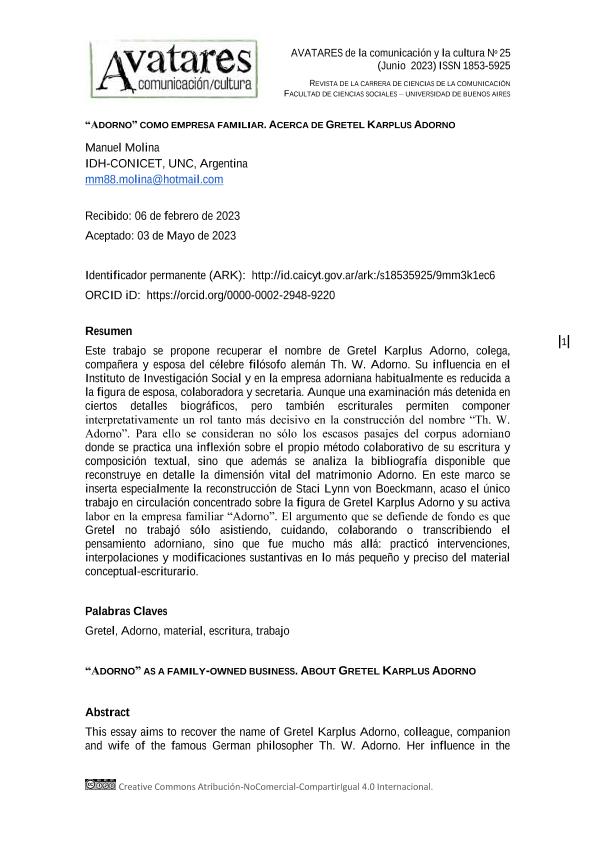Mostrar el registro sencillo del ítem
dc.contributor.author
Molina, Manuel

dc.date.available
2024-03-21T15:03:55Z
dc.date.issued
2023-03
dc.identifier.citation
Molina, Manuel; “Adorno” como empresa familiar: Acerca de Gretel Karplus Adorno; Universidad de Buenos Aires. Facultad de Ciencias Sociales. Carrera de Ciencias de la Comunicación; Avatares de la Comunicación y la Cultura; 25; 3-2023; 1-16
dc.identifier.uri
http://hdl.handle.net/11336/231202
dc.description.abstract
Este trabajo se propone recuperar el nombre de Gretel Karplus Adorno, colega, compañera y esposa del célebre filósofo alemán Th. W. Adorno. Su influencia en el Instituto de Investigación Social y en la empresa adorniana habitualmente es reducida a la figura de esposa, colaboradora y secretaria. Aunque una examinación más detenida en ciertos detalles biográficos, pero también escriturales permiten componer interpretativamente un rol tanto más decisivo en la construcción del nombre “Th. W. Adorno”. Para ello se consideran no sólo los escasos pasajes del corpus adorniano donde se practica una inflexión sobre el propio método colaborativo de su escritura y composición textual, sino que además se analiza la bibliografía disponible que reconstruye en detalle la dimensión vital del matrimonio Adorno. En este marco se inserta especialmente la reconstrucción de Staci Lynn von Boeckmann, acaso el único trabajo en circulación concentrado sobre la figura de Gretel Karplus Adorno y su activa labor en la empresa familiar “Adorno”. El argumento que se defiende de fondo es que Gretel no trabajó sólo asistiendo, cuidando, colaborando o transcribiendo el pensamiento adorniano, sino que fue mucho más allá: practicó intervenciones, interpolaciones y modificaciones sustantivas en lo más pequeño y preciso del material conceptual-escriturario.
dc.description.abstract
This essay aims to recover the name of Gretel Karplus Adorno, colleague, companion and wife of the famous German philosopher Th. W. Adorno. Her influence in the Institute for Social Research and in Adorno's thought is usually reduced to the figure of collaborator and secretary. However, a closer examination of certain biographical, but also scriptural details will allow us to compose interpretatively a more decisive role in the construction of the name “Th. W. Adorno”. For this purpose, we consider not only the few passages in the Adorno corpus where the collaborative method of writing and textual composition is discussed, but we also analyze the available bibliography that reconstructs in detail the vital dimension of the Adorno marriage. The reconstruction by Staci Lynn von Boeckmann, perhaps the only work in circulation that concentrates on the figure of Gretel Adorno and her active work in the family business “Adorno”, is especially inserted in this framework. The underlying argument is that Gretel did not work only by assisting, caring, collaborating or transcribing Adornian thought, but went much further: she practiced interventions, interpolations and substantive modifications in the conceptual-writing material.
dc.format
application/pdf
dc.language.iso
spa
dc.publisher
Universidad de Buenos Aires. Facultad de Ciencias Sociales. Carrera de Ciencias de la Comunicación

dc.rights
info:eu-repo/semantics/openAccess
dc.rights.uri
https://creativecommons.org/licenses/by-nc-sa/2.5/ar/
dc.subject
GRETEL
dc.subject
ADORNO
dc.subject
MATERIAL
dc.subject
ESCRITURA
dc.subject
TRABAJO
dc.subject.classification
Otras Filosofía, Étnica y Religión

dc.subject.classification
Filosofía, Ética y Religión

dc.subject.classification
HUMANIDADES

dc.title
“Adorno” como empresa familiar: Acerca de Gretel Karplus Adorno
dc.title
“Adorno” as a family-owned business: About Gretel Karplus Adorno
dc.type
info:eu-repo/semantics/article
dc.type
info:ar-repo/semantics/artículo
dc.type
info:eu-repo/semantics/publishedVersion
dc.date.updated
2024-03-08T14:24:28Z
dc.identifier.eissn
1853-5925
dc.journal.number
25
dc.journal.pagination
1-16
dc.journal.pais
Argentina

dc.journal.ciudad
Ciudad Autónoma de Buenos Aires
dc.description.fil
Fil: Molina, Manuel. Consejo Nacional de Investigaciones Científicas y Técnicas. Centro Científico Tecnológico Conicet - Córdoba. Instituto de Humanidades. Universidad Nacional de Córdoba. Instituto de Humanidades; Argentina
dc.journal.title
Avatares de la Comunicación y la Cultura
dc.relation.alternativeid
info:eu-repo/semantics/altIdentifier/url/https://publicaciones.sociales.uba.ar/index.php/avatares/article/view/8226
Archivos asociados
